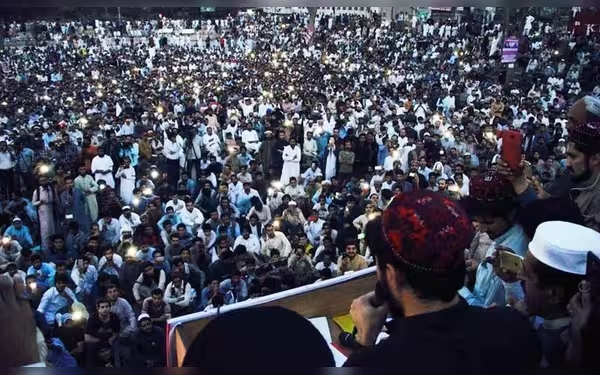Saturday, November 16, 2024 07:50 PM
KP Government Prohibits Officials from PTM's Pashtoon Qaumi Jirga
- KP government bans officials from PTM's jirga participation.
- Section 144 imposed in Khyber district for 30 days.
- PTM activists vow to proceed with the jirga despite restrictions.
 Image Credits: dawn
Image Credits: dawnKP government bars officials from PTM's Pashtoon Qaumi Jirga, citing security concerns and legal implications for participants.
The Khyber Pakhtunkhwa (KP) government has taken a firm stance against the Pashtun Tahaffuz Movement (PTM) by prohibiting its officials and employees from participating in the upcoming Pashtoon Qaumi Jirga. This three-day event, organized by the PTM, is set to take place in Khyber district starting October 11. The government's decision comes in the wake of a federal ban on the PTM, which was declared an "unlawful" organization under the Anti-Terrorism Act of 1997 due to concerns over national peace and security.
According to a notification issued by the KP chief secretary, the PTM's activities are deemed a "significant danger" to public order and safety. The notification explicitly states that participation in any program or activity of a proscribed organization is unlawful, and both government employees and the general public are warned against any association with the PTM. The notification emphasizes that anyone found participating in such activities could face legal consequences.
Furthermore, the notification highlights that the banned Tehreek-i-Taliban Pakistan (TTP) has expressed support for the PTM's activities. This connection raises serious concerns, as any involvement with the PTM could label individuals as facilitators or supporters of a terrorist organization, which is a serious offense under Pakistani law.
In addition to the warnings, Khyber Deputy Commissioner Captain (retired) Sanaullah Khan has imposed Section 144 in the district for 30 days. This legal provision restricts gatherings of more than four people to prevent potential disturbances and maintain law and order. The order reflects the government's commitment to ensuring the safety of the public amid rising security threats.
Despite the government's prohibitions, diehard PTM activists have gathered in Jamrud, vowing to proceed with their plans for the jirga. They are determined to hold their ground until the event begins, with thousands of delegates expected to arrive from various regions, including Balochistan. This defiance poses a challenge to the government's authority and raises questions about the effectiveness of the imposed restrictions.
As the situation unfolds, it is crucial for citizens to remain informed about the legal implications of their actions. The KP government's strict measures serve as a reminder of the delicate balance between freedom of expression and national security. While the right to assemble and express opinions is fundamental, it is equally important to consider the potential consequences of associating with organizations deemed unlawful by the state. The ongoing developments in Khyber district will undoubtedly shape the political landscape in the region, and it is essential for the public to stay vigilant and aware of their rights and responsibilities.













